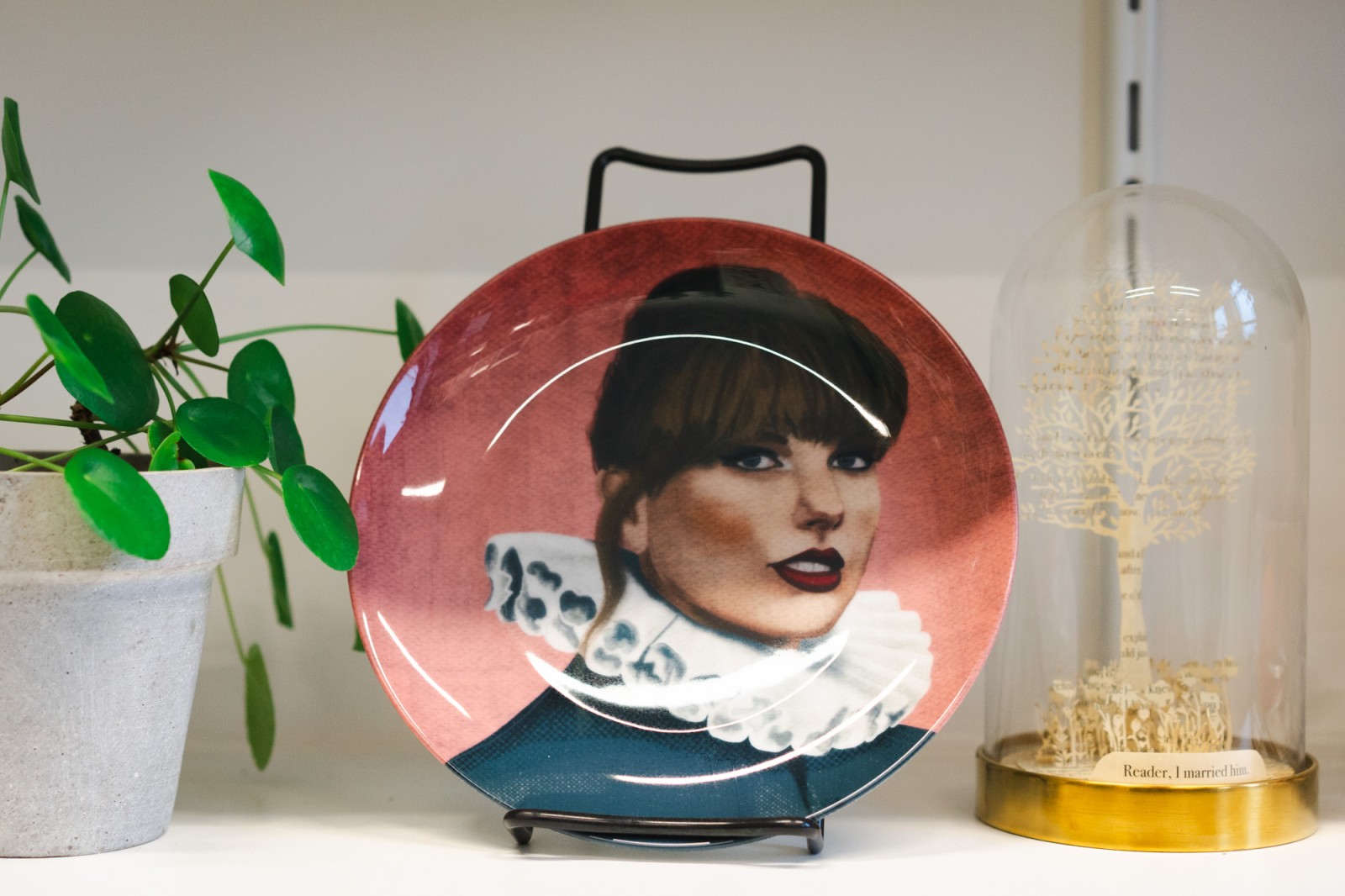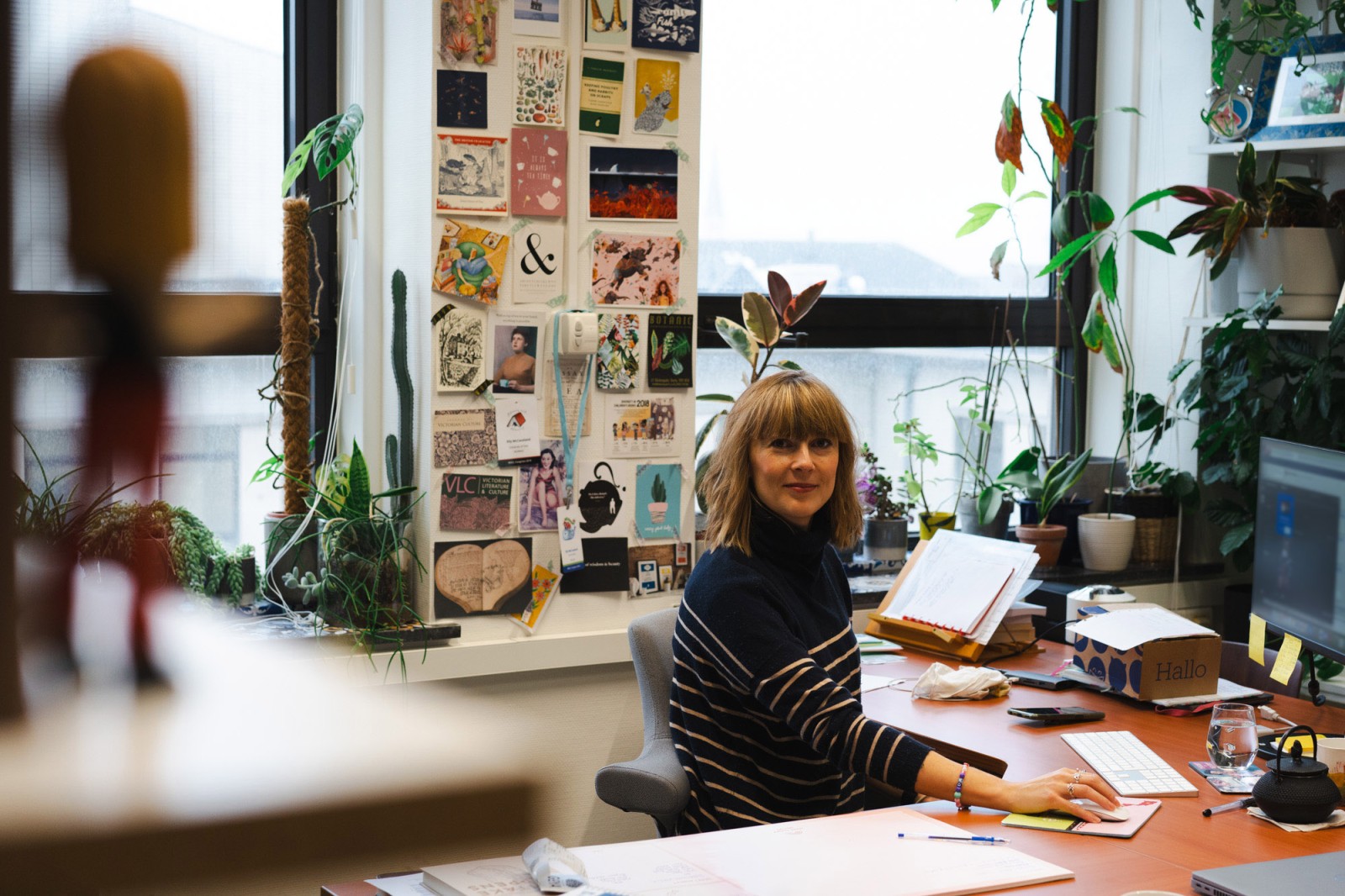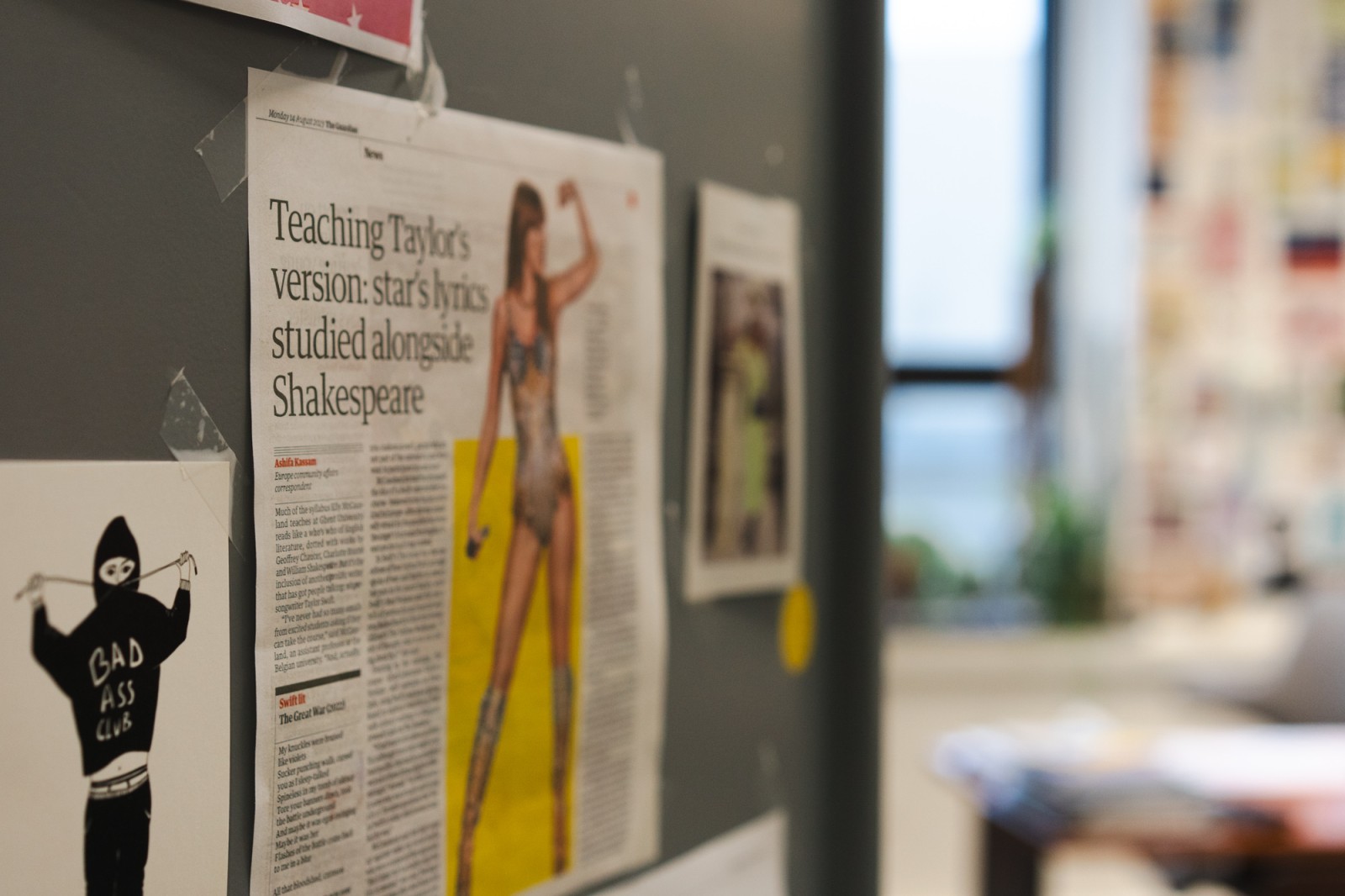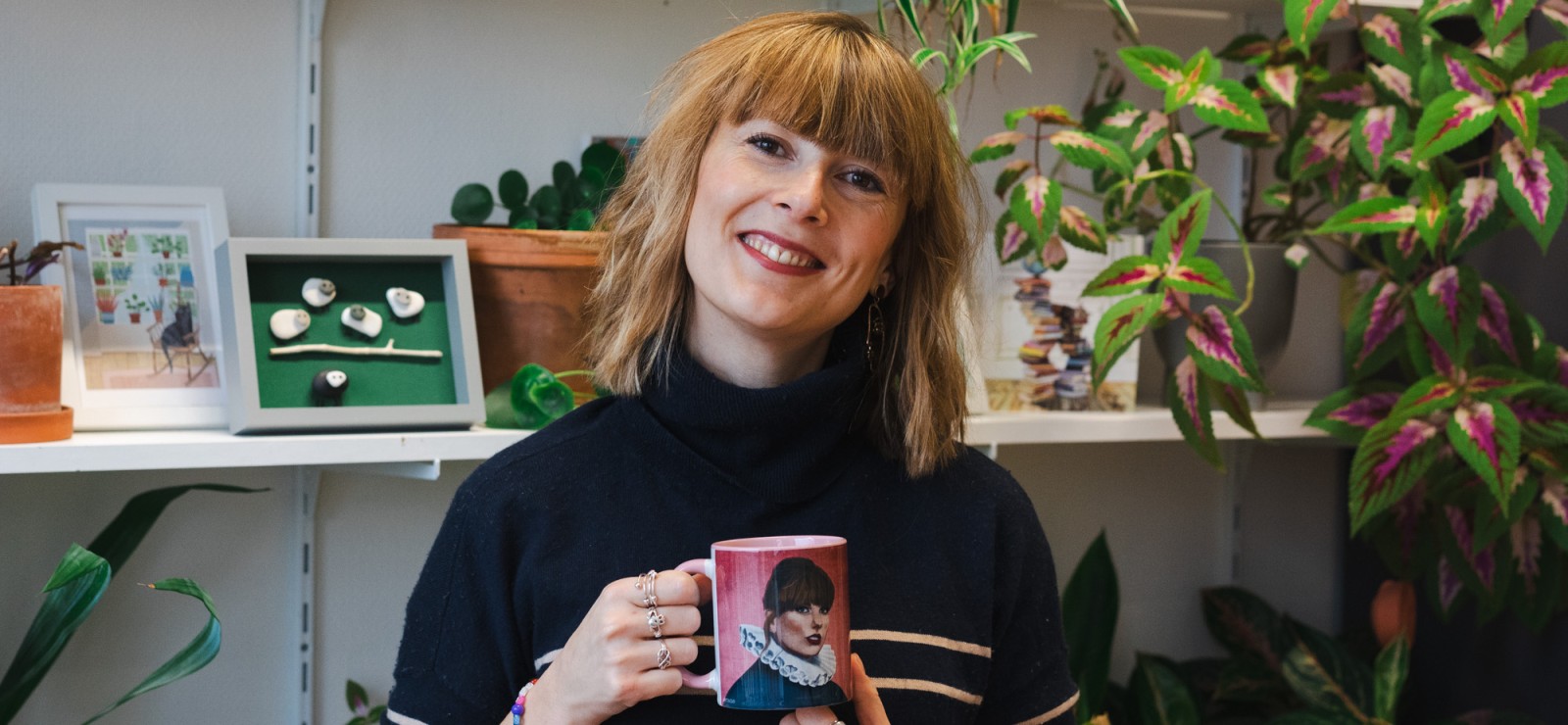This summer it was hard to miss: at Ghent University you would soon be able to take a “Taylor Swift-class”. A storm of reactions blew up, the crackle could be heard all the way to the United States. In the eye of the storm: professor Elly McCausland and her elective course Literature (Taylor’s version). “It was a lot, but I’ve grown quite a thick skin.”
On the wall-to-wall book shelf in Elly’s office, classics from the likes of Shakespeare cozy up to The Hunger Games by Suzanne Collins. In the middle of the organised chaos of office plants, colourful prints on the wall and even a decorative plate with the image of Taylor Swift on it, Elly is industriously typing away behind her computer screen. Nothing gives away that only a few months ago things weren’t quite as peaceful. When Literature (Taylor’s version) became world news overnight.
“It was completely insane”, Elly remembers. “I was in L.A. for a conference and every time I opened my inbox there were more and more e-mails. I was constantly on my phone because of the stream of requests and phone calls. Swedish and Irish radio stations, the Guardian, BBC World News, CNN …”
Whether she was nervous to go live on one of the biggest tv stations in the world? “Actually, it was a bit of an anticlimax, because I was just sitting in my kitchen, looking at a blank screen on Zoom. You only hear the news anchor’s voice. And ten minutes later the chat is finished and you don’t really know what it looked like until you can rewatch the interview. Either way, I’m quite used to public speaking and I’m enthusiastic to talk about the course, so it was still very cool.”

Elly McCausland: “It was completely insane. I was constantly on my phone because of the stream of requests and phone calls. Swedish and Irish radio stations, the Guardian, BBC World News, CNN …”
An auditorium, not a kindergarten
With names such as Geoffrey Chaucer, Charlotte Brontë and William Shakespeare on the reading list, it soon became clear that Literature (Taylor’s version) was not going to be an easy fanclub. Yet that is the image many media outlets put up of it. “It’s an auditorium, not a kindergarten”, one De Morgen journalist even wrote.
“It’s definitely not a kindergarten”, Elly laughs. “It’s a very serious and ambitious course. But Taylor Swift’s songs are a gateway to the heavier topics. For example, in one seminar, we looked at elegy, poetry about death and mourning. We looked at five of her songs that are about death and related them to three poems, one from the 10th century, originally written in old English, one from the 18th century and one from the 19th. Some students said they would never have thought that you could connect these things and they found that really interesting. I'm pretty proud of the range of subjects that we've covered.”
Reclaiming girl culture
And that quote from De Morgen? It got a second life. In true Taylor Swift style, Elly reclaimed the sentence by putting it on a t-shirt and wearing that during her opening lecture.
“The way Taylor Swift reclaims the narrative that the media tell about her, raises a lot of interesting questions. Who controls the narrative? How do we perceive a narrative? Who has the power of interpretation? People often see popular culture, and girl culture in particular, as not worthy of study, and that makes no sense to me. It's popular, therefore we should study it. It tells you so much about the zeitgeist, about your own culture, and it enables critical thinking. Take the Gothic novel. That was a sensation in the 18th century, but scholars saw it as really suspect. Also because it was primarily seen as a women's artform, both in writing and reading. So it wasn’t worthy. Today, of course, the novel is one of the highest forms of art.”
That type of sexism is not new, Elly continues. “So much of the scepticism about Taylor Swift, her music and the Swifties is basically sexism. Think of Twilight or The Hunger Games. Everything girls love, is seen by society as inferior. Female fandom and male fandom are just not given the same weight. I really want to try and reclaim girl culture as a worthy subject of study. I think it’s really important for young women to see that what they appreciate is legitimate.”

Elly McCausland: "So much of the scepticism about Taylor Swift, her music and the Swifties is basically sexism. Everything girls love, is seen by society as inferior."
Person of the year
Now the media storm seems to have subsided, Elly looks back tired but pleased. “It has been the busiest four months of my life. I bought a house and moved. I hired a PhD student from 165 applications. I finished a 90,000 word book, taught two courses and took an intensive Dutch course two nights a week. On top of that the whole Taylor Swift thing snowballed. I’ve never worked so hard in my life (laughs), but honestly, professionally and personally, I've never been happier.”
Elly’s words echo the interview Taylor Swift gave in Time Magazine, that recently named her Person of the Year. There Swift says that “this is the proudest and happiest I’ve ever felt, and the most creatively fulfilled and free I’ve ever been.”
“There are some parallels there”, Elly smiles, “Sometimes I feel like I'm piggybacking off someone else's fame, which makes me a bit uncomfortable. But I find her very inspirational and I’m just trying to make literature more accessible and more interesting to as many people as possible. I think I've done that and I really enjoy doing it. The attention for the course was a big surprise, but I'm really pleased with the way it turned out.”
It turned out to be a great year for both women. Elly was recently even promoted to associate professor, on Taylor Swift’s birthday no less. Coincidence?

Elly McCausland: "I find Taylor Swift very inspirational and I’m just trying to make literature more accessible and more interesting to as many people as possible. The attention for the course was a big surprise, but I'm really pleased with the way it turned out.”
Read also
Identifying emotions in texts, a language technology marvel
With the aid of AI, Ghent-based company AlfaSent is able to recognise emotions in texts. It’s a prime example of language technology, an area that is rapidly gaining ground. Founder and UGent alumna Ellen De Geyndt: “I’ve always been interested in both language and technology but I wasn’t aware that I could combine the two.”
Are classical languages still of any use?
With clock-like regularity the debate pops up about whether studying Greek and Latin is still useful. Some claim that classical languages are useless on the job market. For others, they are the foundation of our society. What should we think about that? We asked hellenist Evelien Bracke and got a nuanced answer.
Ghent University to train the language technologists of the future
At the Faculty of Arts and Philosophy, starting next academic year, you can opt for an educational track to become a language technologist. A sought-after profile on the job market, so it seems.
What exactly is a good book?
The summer months are reading months for many people. But what makes a good book? Is there a formula for success? We ask a literary expert.




